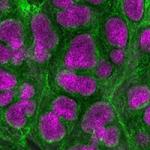
Carmen Williams, M.D., Ph.D.
Senior Investigator
Reproductive & Developmental Biology Laboratory / Reproductive Medicine Group
NIEHS
Research Topics
The Reproductive Medicine Group focuses on translating basic laboratory findings regarding the events surrounding the initiation of pregnancy to the clinical problem of infertility. We study the male and female gametes, how they interact with each other at fertilization, and how the newly formed embryo develops within the female reproductive tract during the first few days of life. Information gathered in these studies will provide a better understanding of factors causing human infertility, which affects approximately 10% of the reproductive age population.
Our approach is to use a mouse model to address questions of what factors are important determinants of egg and embryo quality, and what factors within the oviduct and uterus promote successful fertilization and embryo development. We are also studying how neonatal exposure to an estrogenic endocrine disruptor alters the ability of the reproductive tract environment to support fertilization and embryo development. Environmental contaminants and endocrine disruptors likely contribute to human infertility because of cumulative effects on the quality of both sperm and eggs, and their impact on the female reproductive tract environment. These problems are compounded because couples delay childbearing and therefore have longer exposure to various environmental insults. There is experimental evidence that environmental exposures can disrupt processes of oocyte growth and maturation needed to generate healthy, fertilizable eggs and embryos that are capable of full term development. Less is known regarding factors that affect sperm quality; however, environmental exposures such as alcohol use, smoking, and certain heavy metals clearly have a negative influence on sperm. We know from our studies in the mouse that phytoestrogen exposure in the neonatal period can disrupt ovarian function and causes abnormalities in the female reproductive tract that diminish the ability of the reproductive tract to support embryo development and implantation. Further work in these areas may provide insights into how endocrine disruptors and other environmental toxins can affect human fertility and reproductive tract function, and may have relevance to development of reproductive tract tumors and endometriosis.
Biography
Dr. Williams obtained her MD from Duke University School of Medicine and completed a residency in Obstetrics & Gynecology at Pennsylvania Hospital and a fellowship in Reproductive Endocrinology & Infertility at the University of Pennsylvania. She subsequently completed a PhD and postdoctoral training with Richard Schultz at Penn and joined the Penn faculty as an Assistant Professor of Obstetrics & Gynecology. She moved to the NIEHS in 2007, where she leads the Reproductive Medicine Group. She became Deputy Chief of the Reproductive and Developmental Biology Laboratory in 2017.
Selected Publications
- Ji S, Chen F, Stein P, Wang J, Zhou Z, Wang L, Zhao Q, Lin Z, Liu B, Xu K, Lai F, Xiong Z, Hu X, Kong T, Kong F, Huang B, Wang Q, Xu Q, Fan Q, Liu L, Williams CJ, Schultz RM, Xie W. OBOX regulates mouse zygotic genome activation and early development. Nature. 2023;620(7976):1047-1053.
- Padilla-Banks E, Jefferson WN, Papas BN, Suen AA, Xu X, Carreon DV, Willson CJ, Quist EM, Williams CJ. Developmental estrogen exposure in mice disrupts uterine epithelial cell differentiation and causes adenocarcinoma via Wnt/β-catenin and PI3K/AKT signaling. PLoS Biol. 2023;21(10):e3002334.
- Savy V, Stein P, Shi M, Williams CJ. PMCA1 depletion in mouse eggs amplifies calcium signaling and impacts offspring growth†. Biol Reprod. 2022;107(6):1439-1451.
- Gambini A, Stein P, Savy V, Grow EJ, Papas BN, Zhang Y, Kenan AC, Padilla-Banks E, Cairns BR, Williams CJ. Developmentally Programmed Tankyrase Activity Upregulates β-Catenin and Licenses Progression of Embryonic Genome Activation. Dev Cell. 2020;53(5):545-560.e7.
- Bernhardt ML, Stein P, Carvacho I, Krapp C, Ardestani G, Mehregan A, Umbach DM, Bartolomei MS, Fissore RA, Williams CJ. TRPM7 and Ca(V)3.2 channels mediate Ca(2+) influx required for egg activation at fertilization. Proc Natl Acad Sci U S A. 2018;115(44):E10370-E10378.
Related Scientific Focus Areas
This page was last updated on Thursday, October 12, 2017

